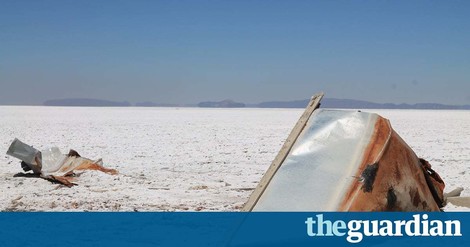Your podcast discovery platform
Curious minds select the most fascinating podcasts from around the world. Discover hand-piqd audio recommendations on your favorite topics.

piqer for: Climate and Environment Global finds Globalization and politics
I'm a freelance journalist, currently based in Madrid. I used to be a News Producer at CNBC in London before, but I thought a little bit more sun might do me good. Now I write for several news organizations, covering a range of topics, from Spanish politics and human rights for Deutsche Welle to climate change for La Marea.
Climate Change Didn't Kill The Lake ... Who Did?
We've been talking a lot about water in 2017. From drought to floods and sea level rise, water is at the center of the climate change debate. And that's a good idea because all our civilization revolves around water, and any change in its distribution will mean massive life changes for some, many or all of us.
For the Urus-Muratos people, the change is already here. They had fished the waters of salty lake Poopó, in Western Bolivia, "since time immemorial". But now the lake is gone. In its place, there's a salt flat.
Now, abandoned fishing boats rust and splinter on the burning salt, amid skeins of desiccated fishing nets and grubby flamingo feathers. In the village of Villa Ñeque, stranded inland years ago, Vicente Valero, 48, doubts it’s worth repairing his staved-in canoe.
As always, attributing phenomena to climate change is tricky. There's no certainty that Hurricane Harvey, for example, was a product of global warming (although there are serious hints that its vicious power was). And it's not clear whether Lucifer, the heatwave that hit Europe last summer, would have happened if we were at pre-industrial CO2 concentration levels (but heatwaves like these will happen more often as global temperatures rise).
The same happens with the vanishing lake Poopó. A drought (connected or not with climate change) dried it up, but it's the "business as usual" attitude that killed it completely. Poorly planned irrigation, abuse of water resources by mines and pollution have sealed the lake's fate. This is an excellent example of how adaptation is needed now, everywhere, to survive the most likely effects of climate change.
As a climate reporter from Spain, the driest country in Europe, desertification is one of my main concerns (and I'm actually working on a long read about it). This tragic example could be replayed in my own doorstep. And yours. And it's really scary.

glad you piqd this article, thanks! (i had spotted it in 'the guardian' before). and it's good to know that you will keep sn eye on the situation in spain, which is just as scary as far as i know.